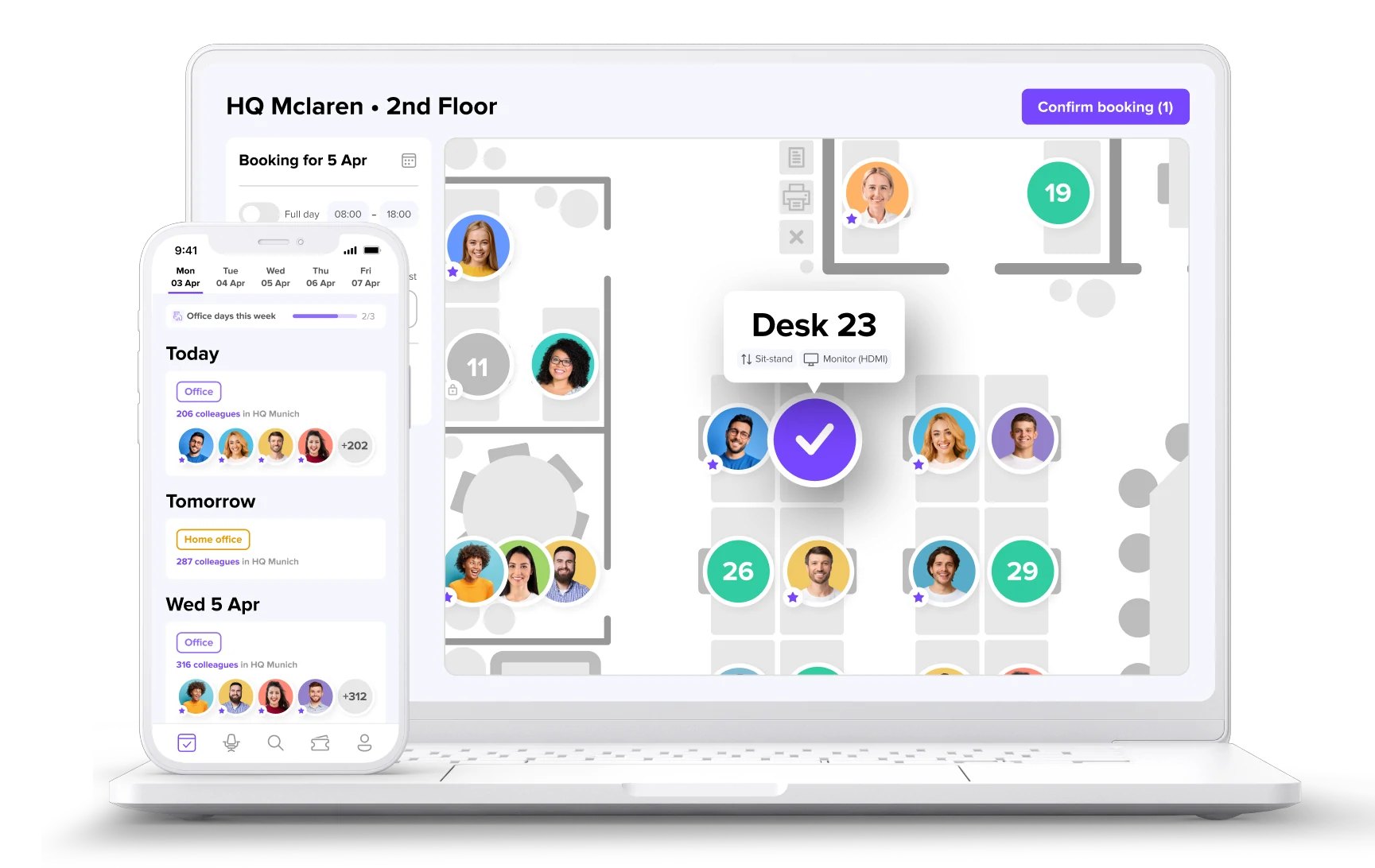
Objectives of office management: responsibilities and new challenges
There is no chance you haven’t noticed it and experienced it. The way we work and the role of our offices have drastically changed over the last couple of years. Now the question is: how do you adapt and keep operations and processes running seamlessly? These are the core objectives of office management. But, finding the perfect angle to embrace these changes and make the most of them is a collective task. Team leaders, HR, IT, facility departments, and office managers have to work together to approach the modern challenges of office management, from flexible work to the rise of technology and the need for more sustainability at work. Here is a quick guide about the role of office managers, the new aspects to consider, and the reasons to use the deskbird app to run your workplace smoothly and efficiently!
The main functions of an office manager vs. a facility manager
The objectives of an office manager
The function of an office manager is to focus on managing operations and processes to fulfill employees’ needs. They play a pivotal role in orchestrating the smooth operation of the workplace by coordinating teams and procedures to maintain productivity and ensure efficiency. By creating and refining approaches, they streamline tasks and foster a cohesive work atmosphere. Managing workers is also a cornerstone of their duties. It can involve everything from scheduling meetings and appointments to handling workplace issues and providing office supplies. In addition, they efficiently plan and oversee a diverse range of office activities.
Summary of the main objectives of office management:
- coordinating teams and processes;
- supervising office supplies;
- ensuring efficiency;
- creating processes;
- managing employees;
- scheduling meetings and appointments;
- planning and coordinating office activities;
- handling workplace conflicts and issues.
🎬 Watch this less than two-minute video about the features of the deskbird app to learn more about our mission and how we can support your hybrid work environment!

The role of a facility manager
Unlike office managers, facility leaders are more focused on running and improving the work environment to help employees thrive. Their role is crucial in the operational functionality of an office. It involves overseeing the maintenance, safety, and efficiency of physical workplaces to provide a secure and optimal working environment. For instance, they supervise building maintenance schedules and coordinate renovations or space planning to adapt to organizational needs. They handle the day-to-day emergency responses and long-term strategic facility planning. Their objective is to extend the life cycle of assets while minimizing costs and maximizing employee well-being and productivity.
Summary of the main goals of facility management:
- improving the office layout;
- ensuring the facilities’ maintenance;
- managing real estate forecasting;
- collaborating with external contractors and providers;
- analyzing space utilization.
These two job positions are interconnected but also different. Yet, depending on a company’s size, the same person sometimes fulfills these two roles, which explains why they are often mismatched.
The new objectives regarding office management
Adjusting to flexible work
Flexible work isn’t only a consequence of COVID-19. It is also due to the arrival of Gen Z in the workplace and the unstoppable expansion of technological advancements. Younger generations (Millennials and Gen Z) want more work-life balance, and the rise of technology helps make it happen.
“Asynchronous” is the best way to describe this new era of work. Employees are now more flexible in their vision and approach to work. They can plug in from different locations and on various projects at different times.
This has significant consequences for office management. For example, the role of the workplace has changed as people no longer come on-site daily, and collaboration has taken a new turn. All these shifts are forcing facility managers to adapt and review processes to maintain coordination and efficiency.
👉 Discover 12 examples of flexibility at work!
Focusing more on employee well-being and DEI practices
When you look at the depression rates among Baby Boomers, Gen X, Millennials, and Gen Y, you can see that the younger the workers are, the quicker they show mental health issues and symptoms of burnout. Employee well-being and mental health can no longer be aspects that are ignored, and office managers have a key role to play in this regard. The same goes for DEI (Diversity, Equity, and Inclusion) practices, which have a direct link with mental health in the professional world. Well-being and DEI in the workplace are key to office management strategies for a workforce that is healthy, productive, engaged, and loyal.
Ensuring cyber security and data privacy
With cyber threats becoming more sophisticated and prevalent, a breach can lead to devastating consequences, including financial loss, legal repercussions, and irreparable damage to a company’s reputation. Along with IT departments, office managers must prioritize the development of robust cyber risk management strategies to protect the integrity and confidentiality of corporate data. The adoption of these solutions also fosters trust with clients and complies with increasingly strict regulatory requirements. Working hand in hand with IT team members, learning about emerging cyber security trends, and investing in secure technologies are now critical for office managers.
Using technology to reach office management objectives better
With the constant development of technologies and the digitalization of the workplace, being tech-savvy is now imperative to grow and succeed in the world of work. For office managers, it is becoming increasingly critical to harness and integrate tech into their daily operations. Fluency in technology is no longer a plus. It is a must to perform the job efficiently. It allows for better coordination and streamlining of workflows, supervising remote or hybrid teams, and maintaining effective communication channels within and outside the organization. As data management and cybersecurity are also crucial, using specialized software and tools to safeguard sensitive information and ensuring compliance with regulations is essential, too.
Bringing more sustainable practices into the workplace
Living and working more sustainably is everyone’s duty. Integrating eco-friendly and responsible practices in the work environment is, therefore, one of the most important tasks office managers (among others) have to carry out from now on. From turning the workplace into a paperless office to efforts like offering only vegetarian lunch options or using only renewable energy, there are many ways to make it happen. Here again, working hand in hand with other departments might be necessary. For example, implementing systems that work with green energy and smart sensors are initiatives office and facility managers can apply together.
🌿 Read our complete guide about sustainability in the office.

The role of the deskbird app in supporting office management objectives
Accurate data about office space use and occupancy
Although the benefit of using workplace analytics is more obvious for facility leaders, office managers also have an interest in checking this data. As office management objectives include coordinating and developing processes to increase efficiency, productivity, and employee satisfaction, knowing how office space is used can be very valuable for them, too. For example, they might realize that the content creation team is spending more time in the office than the customer service team but that they often lack space. They can then decide to study how to better optimize the space to create a content creation room to do photoshoots and stow equipment, for instance.
Interactive floor plan
Office managers often need to discuss face-to-face with employees from all departments. Therefore, knowing who is working where can be quite useful for them. Thanks to our interactive floor plan, they can figure out who is on-site and where in real time instead of walking around looking for team members. This is a game changer as it saves them a lot of time, which allows them to focus on more meaningful tasks. Lastly, the interactive office map also enables them to see which meeting rooms are still available in case they need to schedule a last-minute meeting.
Workspace booking
Talking about scheduling, as one of the key functions of office managers is to plan and organize appointments and meetings, using a desk and room booking software like deskbird makes total sense. For greater efficiency, the deskbird app enables them to book the ideal workspace, whether it be a conference or a huddle room. With three clicks, the perfect meeting space is reserved, scheduling conflicts are prevented, and employees get the room and the resources they need for that specific meeting. The simplicity of our tool makes it one of the most user-friendly solutions you can use and ensures everyone in your workforce gets the most out of it.
💡 Check out our customers’ reviews to discover what our users think about the deskbird app!

Office events
Lastly, one of the objectives of office management is also to plan, organize, and run work events. With the deskbird office event feature, office managers can notify the entire workforce about the next event happening in the workplace. Thanks to our seamless integrations, your staff gets notified on Slack, MS Teams, iCalendar, or whatever tool they use. There is no need to switch from one resource to another. They get all the information they require on their favorite platform. But the deskbird app is also available on mobile. Therefore, they can check at any time and from anywhere the event’s details directly from their phone and say if they are coming or not.
We hope you are now ready to tackle the objectives of office management fiercely and understand the new challenges that require changes in the way to run operations and processes. The rise of flexible work, the development of technology, and the new expectations of younger generations are reshuffling the duties and goals of office managers. But deskbird is here to help them in this transition so they can accomplish their job successfully. Request a free demo of the deskbird app to discover concretely how our tool works and how it can support leaders but also your hybrid workforce!
Frequently Asked Questions
What is the main objective of office management?
The main objective of office management is to create a productive, organized, and efficient work environment. It ensures people, processes, and resources are coordinated effectively. Good office management reduces waste, improves communication, and supports smooth day-to-day operations across the organization.
Why is office space management important for hybrid workplaces?
In hybrid workplaces, presence fluctuates day to day. Effective space management ensures that desks, meeting rooms, and resources are neither overbooked nor underutilized.  It helps organizations reduce waste, improve employee satisfaction, and align workspace capacity with actual demand.
How does deskbird simplify office management?
deskbird brings all workplace management needs into one app. Employees can book desks, rooms, and parking, while managers track usage and optimize layouts through analytics. With integrations for Microsoft 365, Google, and Slack, deskbird makes hybrid office management simple, transparent, and scalable.

Level up your office operations with ease
- Manage desks, rooms, and visitors in one place
- Automate manual tasks and reduce admin workload
- Get real-time data to improve office efficiency








%20(1).webp)
